#Wotc
Explore tagged Tumblr posts
Text
Go read check out Unchained Mysteries by Jesse Burneko
I recently was altered to and read a treatise called Unchained Mysteries, and it’s incredible that I had never heard of it before. It’s not a TTRPG, but it is a treatise about TTRPGs, particularly mystery investigation TTRPGs, and how bad they have been for the past 50 years at actually doing investigation gameplay.
For the roughly two years since we went public with Eureka: Investigative Urban Fantasy, we have been fighting a war, an idealogical war on TTRPGs as an artform declared by monopolistic corporations, parasocial “”actual play”” shows, content mill YouTube channels and the loyal adherents of the above. The generals of this vast army, whether they consciously realize it or not, have a financial incentive to teach you that game design is not real and that it doesn’t matter. A consumerbase that understands game design or what a TTRPG is on even the narrowest, shallowest level is one where some people might sometimes choose to play something besides the most popular and heavily advertised game on the market when they are able to recognize that it does not suit their needs.
To this end they teach you “just ignore the rules when they get in the way of the story,” and “a good GM can make anything work.” They task the GM with putting on a one-man show so that people who do not like the kinds of experiences created by the rules of the most popular game do not ever have to engage with the experiences of playing the most popular game, but still buy all the most popular game’s products, and most importantly never buy anything else.
It’s been an uphill battle, but we have been able to carve out a little outpost for ourselves, convert others to the Game Design in Real faction, and occasionally make contact with like-minded individuals who fight for TTRPGs to be treated as a unique and meaningful artform and game, not just an annoying book that gets in the way of your improv session, as most self-identified fans of TTRPGs have been taught to treat them.
Unchained Mysteries is one of those times we discover a powerful ally, and it has been some real wind in my sails, lemme tell you.
As a TTRPG game designer, it really wears on the mind to get the same comments over and over and over from people who don’t even know enough about gleeblor to understand the position they’re taking, that all boil down to the same thing: Telling me that my work, and the work of others trying to design TTRPGs, is, at best, completely meaningless, because the rules we write shouldn’t be assumed to affect anything, that the right way to play TTRPGs is to just ignore the rules and make it up as you go. At worst, they get offended, and demand to know “why I’m trying to tell them how they should play the game” in the instruction manual for the game. And come at me with shonen hero monologues about how as an artist I have no right to even want people to engage with my art the way that I intentionally designed it to be engaged with, let alone have the audacity to express that desire. People’s right to not think about anything and put in the least possible effort for the quickest, shortest gratification is sacred, especially because game design isn’t real, so there’s no way that following the intent behind the design could lead to a more meaningful experience than just running off vibes.
And all this with the financial stress of being unable to keep a “normal” job due to disability, making my art my main source of income on top of the constant reaffirmation that large amounts of potential customers have been taught that the kind of art I’m best at and most passionate about, art that is really really trying to provide a particular experience through its design and intent, is the most undesirable kind of art, if they even know that kind art exists within the medium of TTRPGs at all.
Sorry about all that.
Anyway, it would have been cool to find such a well-written piece of writing that agrees with Eureka’s stance on investigative TTRPG gameplay on one point.
It would’ve been really cool to find such a well-written piece of writing that agrees on two points.
The points made, the problems highlighted, and the solutions proposed within Unchained Mysteries are about a 90% overlap with Eureka: Investigative Urban Fantasy’s, and presents them even more convincingly. (Which is to be expected, since it exists only to make these points rather than also being a whole game.)
If you’re interested in the arguments Eureka: Investigative Urban Fantasy makes and demonstrates about game design, give Unchained Mysteries a read.

#indie ttrpg#ttrpg tumblr#ttrpg community#rpg#ttrpgs#ttrpg#indie ttrpgs#eureka ttrpg#actual play#dnd#d&d 5e#d&d#dungeonsanddragons#starfinder#dungeons and dragons#critical role#dimension 20#d&d 5th edition#d&d 5.5e#wotc#eureka: investigative urban fantasy#eureka
43 notes
·
View notes
Note
Love this
Have you ever said aloud any version of “Oh, Blogatog is not going to like this”, joking or otherwise?
I have.
#mtg#magic: the gathering#magic the gathering#magic the gathering blog#wizards of the coast#wotc#mtg blog#mtg cards#mtg fans
74 notes
·
View notes
Text
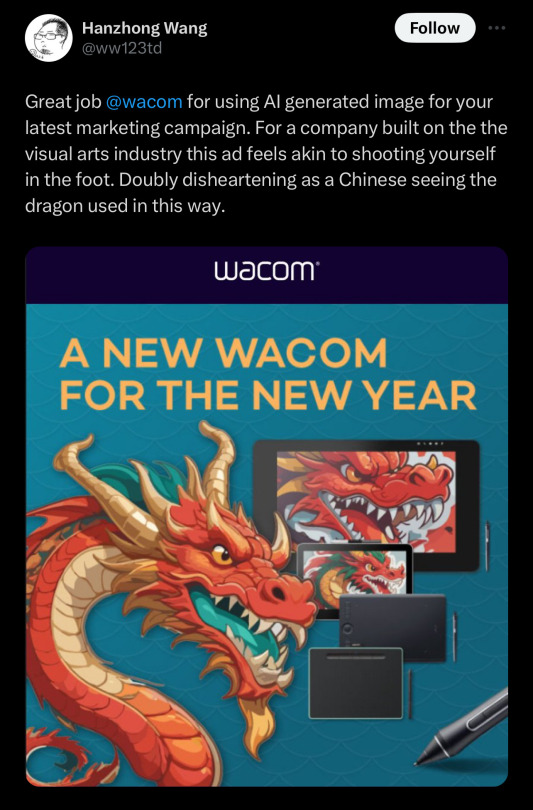

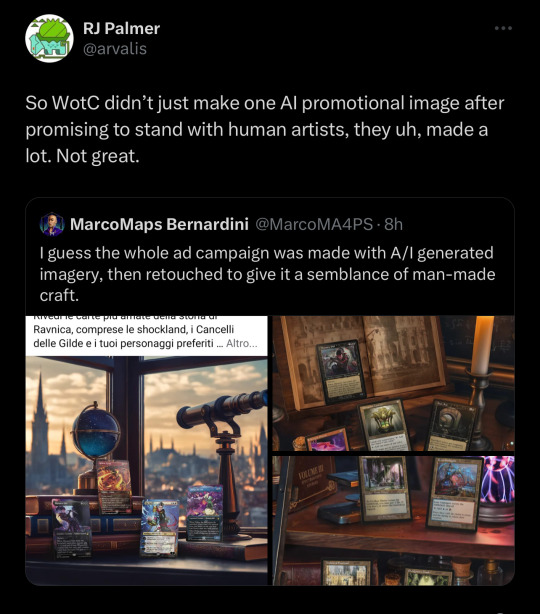
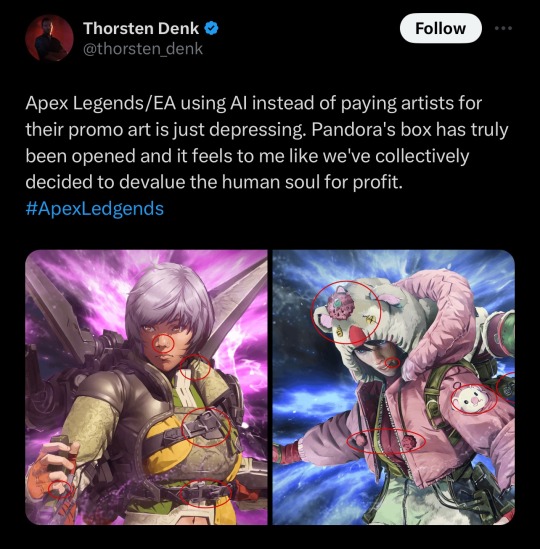
we’re really out here living in an AI dystopian hellscape and this shit has just begun… the future is grim…
#ai#anti ai#wotc#wacom#ai scam#ai scammers#yall warn the less intuitive people in your life about the voice scam stuff… scary af!#ai art#ai generated#ai image#ai artwork#aiartcommunity
22K notes
·
View notes
Text

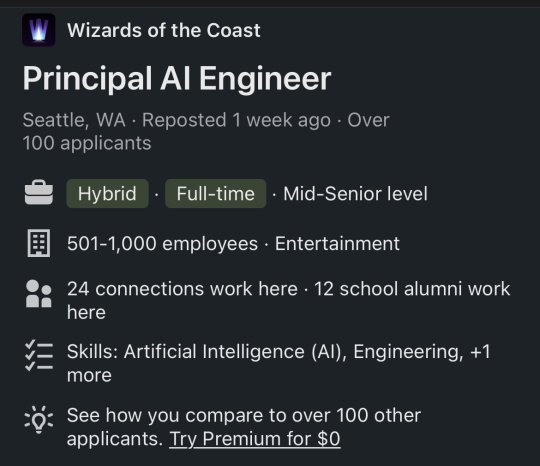
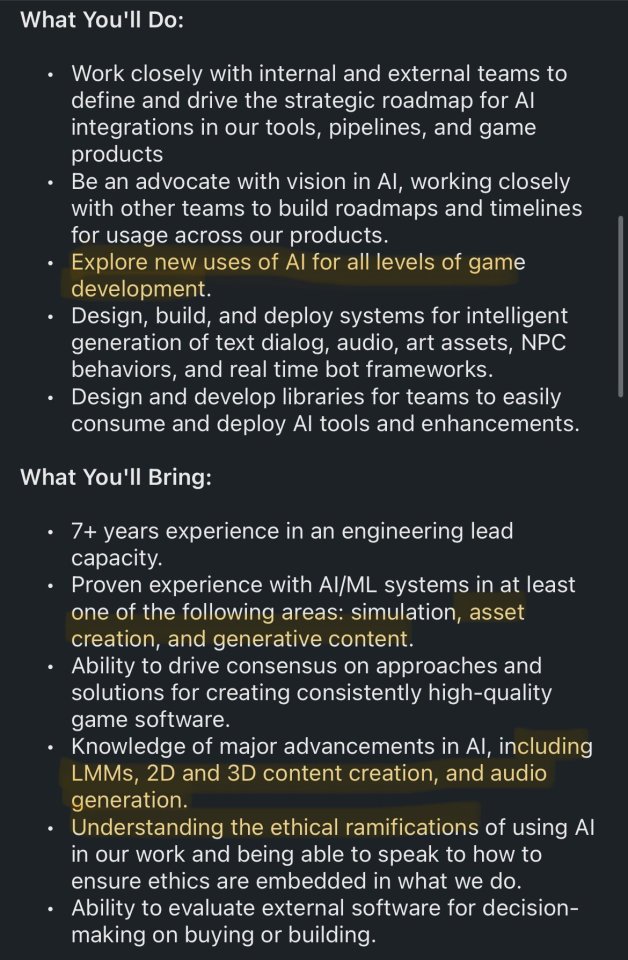
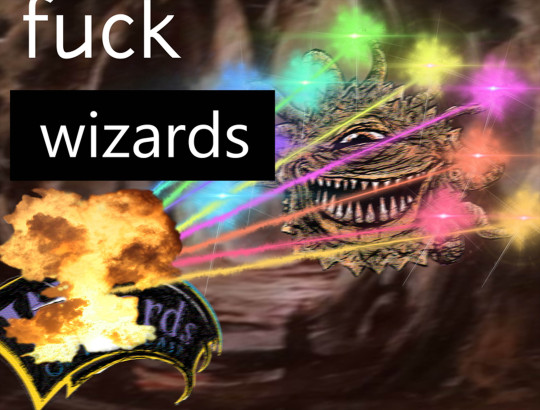
6K notes
·
View notes
Text


5K notes
·
View notes
Text
I love callback cards like this. Also makes me want a Return to Alara so bad.



Her new demonic overlords prized her knowledge of Bant's landscape.
-Wight of the Reliquary
I finally took my Izoni deck out again the other day and gave it a number of updates. Let me tell you, this card is an all-star.
#mtg#magic the gathering#magic: the gathering#magic the gathering blog#wizards of the coast#wotc#mtg blog#mtg cards#mtg fans
21 notes
·
View notes
Text
SPOILERS FOR THE MAGIC CON 2025 BG3 ONESHOT
This is how I imagine the conversation back at camp went between Tav and Astarion and Karlach

#baldur's gate 3#bg3#baldur's gate iii#dnd#magic con 2025#hags to liches#baldurs gate 3#bg3 tav#bg3 astarion#bg3 karlach#karlach#astarion#astarion ancunin#tav#bg3 memes#aabria iyengar#neil newbon#samantha beart#theo solomon#devora wilde#dungeons & dragons#dungeons and dragons#wizards of the coast#wotc#bg3 spoilers#baldurs gate spoilers#baldur's gate#baldurs gate 3 spoilers
425 notes
·
View notes
Text

so uh, DnD Beyond decided to remove people's 2014 content (spells and items) in favour of the 2024 content (5.5e) at random, which is always fun. The wonders of not owning the content you paid for. I think they're just trying very hard to find ways to keep pissing paying users every other week, because at this point I can't believe it isn't on purpose
837 notes
·
View notes
Text
It’s hard to even know what to say about this this D&D5e D&D Beyond shit. It’s like funny. This is what you get for still playing D&D5e at this point. It’s like “leopards eating people’s faces party.” So much for your “accessibility” and “easy to use online tools�� because of D&D Beyond, the thing that we said was a bad idea and a corporate trap and you called us gatekeepers. It’s so obvious that this would happen but I had no idea it would happen as satirically as it’s happening. “D&D5e is so great because you can just homebrew everything, and you can just use online tools!” “Okay, start homebrewing.” 👍
727 notes
·
View notes
Text
Games Workshop when a product is revealed ahead of schedule because of an internal error: Whoopsie! Our bad! Really cool paintjob on that model, though!
Wizards of the Coast, same situation: Our only option is to send in the guys who are famous for lighting strikers on fire.
#I am frankly embarrased i didn't have WotC hiring pinkertons on my 2023 bingo sheet#In hindsight it's obvious given how the year's been going so far#Wizards of the Coast#WotC#Games Workshop#WHAT A YEAR EH LADS#MtG#Magic the Gathering#Warhammer
7K notes
·
View notes
Text
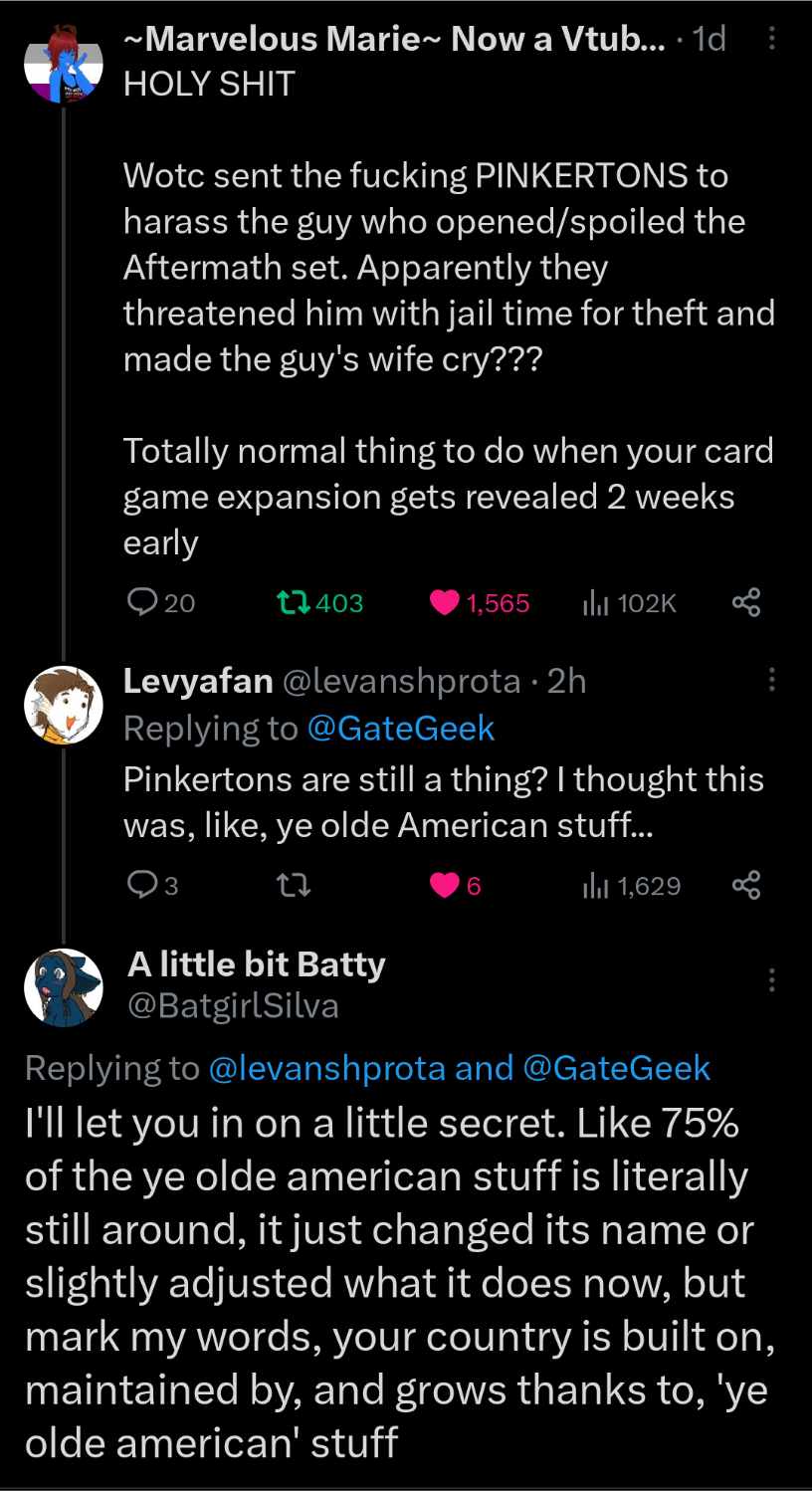
There has to be some level of self-relfection after you hire the honest-to-god PINKERTONS to BREAK SOMEONE'S LEGS on which you're forced to acknowledge that you're now just a straight up movie villain
#wotc#mtg#magic the card game#magic the gathering#wizards of the coast#dnd5e#dungeons and dragons#ttrpg#ttrpg memes#pinkerton#us history
5K notes
·
View notes
Text
Help Save the World of TTRPGs and Their Creators.
Okay I’m being a little dramatic, but at the same time I’m pretty serious. This is a call to action, and the livelihoods of myself and lots of other people, many of them (like myself) disabled, are depending on it. This is a post about why, what you can do about it, and (perhaps least often answered) how.
This post is actually an accompaniment to another discussion by someone else. If you don’t want to listen to a 90-minute in-depth discussion of much of what I’m about to tell you, you can just keep reading. Otherwise, click here or here and listen to this either before or after you read this post. (They’re the same thing, just different sources.)
If you have ever made or reblogged posts urging people to switch from Google Chrome to Firefox, you should be willing to at least give a try to other TTRPGs besides D&D5e for much the same principle reasons. I’m not telling you you have to hate D&D5e, and I’m not telling you you have to quit D&D5e, I’m just asking you to try some other games. If you don’t like them, and you really want to go back to D&D5e, then go back to D&D5e. But how can you really know you won’t like other games if you have literally never tried them? This post is a post about why and how to try them. If you’re thinking right now that you don’t want to try them, I urge you to look below to see if any of your reasons for not wanting to try them are covered there. Because the monopoly that WotC’s D&D5e has on TTRPGs as a whole is bad for me as a game designer, and it’s bad for you as a game player. It’s even bad for you if you like D&D5e. A fuller discussion of the why and how this is the case can be found in the links above, but it isn’t fully necessary for understanding this post, it’ll just give you a better perspective on it.
If you’re a D&D5e player, I’m sure at some point or another, you’ve been told “play a different game”, and it must get frustrating without the context of why and how. This post is here to give you the why and how.
[The following paragraph has been edited because the original wording made it sound like we think all weird TTRPGs suck.]
Before that though, one more thing to get out of the way. I'm going to level with you. There’s a lot of weird games out there.
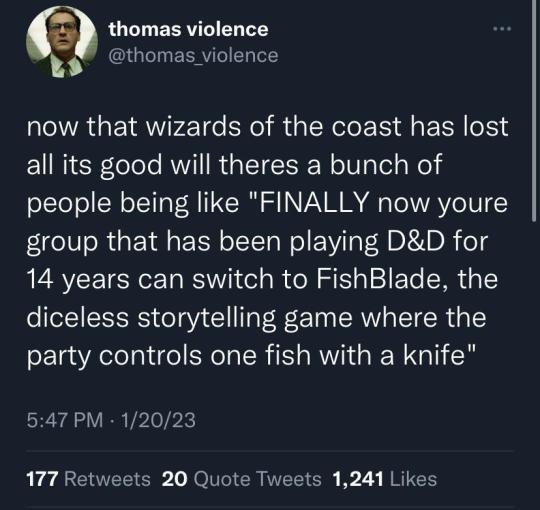
You are gonna see a lot of weird TTRPGs when you take the plunge. Many of them try to completely reinvent what a TTRPG even is, and some fail spectacularly, others really do even up doing something very interesting even if they don't end up being what a core TTRPG player wants. But not every indie RPG is a Bladefish, lots and lots of them are more 'traditional' and will feel very familiar to you, I promise. (And you might even find that you like the weird experimental bladefish type ones, these are usually ideal for one-session plays when your usual group can't play your usual game for any reason.)
You're also going to probably see a lot of very bad games, and man have I got some stories of very bad games, but for now I'm just saying to make sure you read the reviews, or go through curators (several of which will be listed below), before you buy.
Now that that is out of the way, I’m going to go down a list of concerns you may have for why not, and then explain the how.
“I don’t want to learn a whole new set of rules after I already spent so much time learning D&D5e.”
Learning a new set of rules is not going to be as hard as you think. Most other TTRPGs aren’t like that. D&D5e is far on the high end of the scale for TTRPGs being hard and time-consuming to learn and play. If you’ve only played D&D5e, it might trick you into thinking that learning any TTRPG is an overwhelmingly time-consuming task, but this is really mostly a D&D5e problem, not a TTRPG problem as a whole.
“D&D5e has all of these extra online tools to help you play it.”
So what? People have been playing TTRPGs without the help of computers for 50 years. To play a well-designed TTRPG you won’t need a computer. Yes, even if you're bad at math. There are some TTRPGs out there that barely even use math.
“I’m too invested in the narrative and characters of my group’s current ongoing D&D5e campaign to switch to something else.”
There are other games, with better design made by better people for less money, that are the same kind of game as D&D5e, that your current characters, lore, and plot will fit right into and do it better. And no, it's not just Pathfinder, there's others.
“I can’t afford to play another TTRPG.”
You probably can. If you’ve only played D&D5e, you might have been made to think that TTRPGs are a very expensive hobby. They aren’t. D&D5e is actually uniquely expensive, costing more than 3x more than the next most expensive TTRPG I can think of right now. Even on the more expensive end, other TTRPG books will cost you no more than $60, most will cost you less than $20, and a whole lot of them are just free. If you somehow still can’t afford another TTRPG, come to the A.N.I.M. TTRPG Book club mentioned below, nominate the game, and if it wins the vote we will straight up buy it for you.
(By the way, if you had any of the above concerns about trying other games besides D&D5e, that really makes it sound like you are in a textbook abusive relationship with D&D5e. This is how abusers control their partners, and how empires control their citizens, by teaching you to think that nothing could ever get any better, and even though they treat you bad, the Other will treat you even worse.)
“If I don’t play D&D5e, which TTRPG should I play?”
That’s a pretty limited question to be asking, because there will be no one TTRPG for everything. And no, D&D5e is not the one TTRPG for everything, Hasbro’s marketing team is just lying to you. (Pathfinder and PbtA are not the one system for everything either!) Do you only play one video game or only watch one movie or only read one book? When you finish watching an action movie like Mad Max, and then you want to watch a horror movie, do you just rewind Mad Max and watch it over again but this time you act scared the whole time? No, you watch a different movie. I’m asking you to give the artistic medium of TTRPGs the same respect you would give movies.
“I want to play something besides D&D5e, but my friends won’t play anything else!”
I have several answers to this.
Try showing them this post.
If that doesn’t work: Make them. Put your foot down. This works especially well if you are the DM. Tell them you won’t run another session of D&D5e until they agree to give what you want to do at least one try instead of always doing only what they want to do. This is, like, playing 101. We learned this in kindergarten. If your friend really wants to play something else, you should give their game a try, or you’re not really being a very good friend.
If that doesn’t work, find another group. This doesn’t even mean that you have to leave your existing group. A good place to start would be the A.N.I.M. TTRPG Book Club which will be mentioned and linked below. You can also go to the subreddit of any game you’re interested in and probably meet people there who have the same problem you do and want to put together a group to play something other than D&D5e. You might get along great with these people, you might not, but you won’t know until you try. Just make sure to have a robust “session zero” so everyone is on the same page. This is a good practice for any group but it is especially important for a group made of players you’ve just met.
“I only watch actual plays.”
Then watch actual plays of games that aren’t D&D5e. These podcasts struggle for the same reasons that indie RPGs struggle, because of the brand recognition and brand loyalty D&D5e has, despite their merit. I don’t watch actual plays, or else I would be able to list more of them. So, anyone who does watch actual plays, please help me out by commenting on this post with some non-D&D5e actual plays you like. And please do me a favor and don’t list actual plays that only play one non-D&D5e system, list ones that go through a variety of systems. The first one I can think of is Tiny Table.
“I can just homebrew away all the problems with D&D5e.”
Even though I want to, I’m not going to try and argue that you can’t actually homebrew away all the problems with D&D5e. Instead, I’m going to ask you why you’re buying two $50 rulebooks just to throw away half the pages. In most other good RPGs, you don’t need to change the rules to make them fun, they’re fun right out the box.
“But homebrewing D&D5e into any kind of game is fun! You can homebrew anything out of D&D5e!”
Firstly, I promise that this is not unique to D&D5e. Secondly, then you would probably have more fun homebrewing a system that gives you a better starting point for reaching your goal. Also, what if I told you that there are entire RPG systems out there that are made just for this? There are RPG systems that were designed for the purpose of being a toolbox and set of materials for you to work with to make exactly the game you want to make. Some examples are GURPS, Savage Worlds, Basic RolePlaying, Caltrop Core, and (as much as I loathe it) PbtA.
“I’m not supporting WotC’s monopoly because I pirate all the D&D5e books.”
Then you’re still not supporting the smaller developers that this monopoly is crushing, either.
Now, here’s the how. Because I promise you, there’s not just one, but probably a dozen other RPGs out there that will scratch your exact itch.
Here’s how to find them. This won’t be a comprehensive list because I’ve already been typing this for like 3 hours already. Those reading this, please go ahead and comment more to help fill out the list.
First, I’m gonna plug one of my own major projects, because it’s my post. The A.N.I.M. TTRPG Book Club. It’s a discord server that treats playing TTRPGs like a book club, with the goal of introducing members to a wide variety of games other than D&D5e. RPGs are nominated by members, then we hold a vote to decide what to read and play for a short campaign, then we repeat. There is no financial, time, or schedule investment required to join this book club, I promise it is very schedule-friendly, because we assign people to different groups based of schedule compatibility. You don’t have to play each campaign, or any campaign, you can just read along and participate in discussion that way. And if you can’t afford to buy the rulebook we’re going to be reading, we will make sure you get a PDF of it for free. That is how committed we are to getting non-D&D5e RPGs into people’s hands. Here is an invite link.
Next, there are quite a few tumblr blogs you can follow to get recommendations shown to you frequently.
@indierpgnewsletter
@indie-ttrpg-of-the-day
@theresattrpgforthat
@haveyouplayedthisttrpg
@indiepressrevolution
Plenty of podcasts, journalists, and youtubers out there do in-depth discussions of different systems regularly, a couple I can think of off the top of my head are:
Storyteller Conclave (I’m actually going to be interviewed live on this show on April 10th!)
Seth Skorkowsky
Questing Beast
The Gaming Table
Rascal News
Lastly, you can just go looking. Browse r/rpg, drivethrurpg.com, indie press revolution, and itch.io.
Now, if you really want to support me and my team specifically Eureka: Investigative Urban Fantasy, our debut TTRPG, is going to launch on Kickstarter on April 10th and we need all the help we can get. Set a reminder from the Kickstarter page through this link.
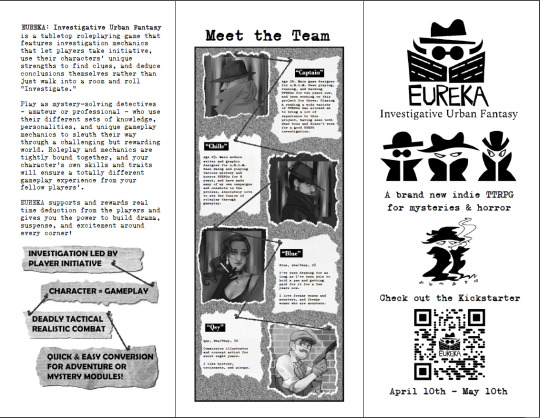
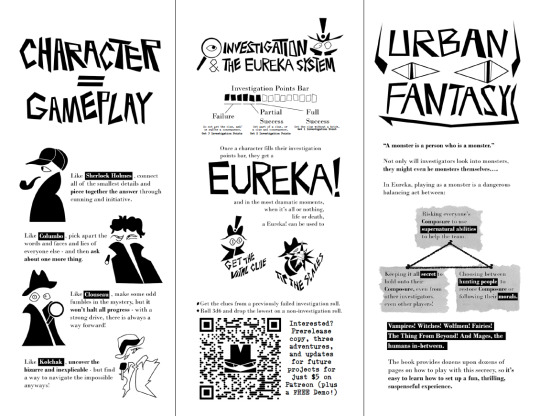
If you’re interested in a more updated and improved version of Eureka: Investigative Urban Fantasy than the free demo you got from our website, there’s plenty of ways to get one!
Subscribe to our Patreon where we frequently roll our new updates for the prerelease version!
Donate to our ko-fi and send us an email with proof that you did, and we’ll email you back with the full Eureka prerelease package with the most updated version at the time of responding! (The email address can be found if you scroll down to the bottom of our website.)
We also have merchanise.

#dnd#dnd5e#dnd 5e homebrew#dungeons and dragons#d&d#d&d 5e#dungeons and dragons 5e#dnd 5e#5e#homebrew#dungeons & dragons#critical role#crit role#dimension 20#actual play#matt mercer#wizards of the coast#wotc#hasbro#ttrpgs#ttrpg#ttrpg community#ttrpg tumblr#tabletop#roleplay#roleplaying#roleplaying games#tabletop roleplaying#tabletop role playing game#fantasy rpg
1K notes
·
View notes
Text






Por si se pregunta "por qué está tan inactivo"
1) se me fue el Internet
2) estoy haciendo una animación con la intro de dan da dan (adoro esa serie)
In case you're wondering "why is she so inactive?"
1) My Internet went out
2) I'm doing an animation with the intro of "Dan da dan" (I love that anime)
Aquí hay un adelanto ;}
#dan da dan#cuphead#cuphead art#cuphead au#wotc#world of two cups#quest cuphead#casino cups mugman#mugman quest#copyhead
167 notes
·
View notes
Photo

Pike
#furryoc#possumancercoart#anthro oc#anthrooc#wotc#furryart#furryartist#owlbear#owl#bear#hybrid#anthro#furry#dnd#dungeons and dragons#icon#commission
153 notes
·
View notes
Text
something about the way nerd and hobbyist communities will settle for the bare minimum.
i'm a doll collector, and in my twenty years of collecting i have seen the quality of dolls, doll clothes, and other doll accessories degrade massively within the last decade, with the steepest decline in the last five years. yet whenever mattel does a release for barbie or american girl, everyone is CLAMORING for it. Doesn't matter if the factory face paint is wonky, doesn't matter if the clothing is thin or has loose threads. People will show up to spend their money. pcs and consoles are getting more and more expensive and everyone says that's just the price we have to pay to in order to game. games will release, unfinished, full of bugs, charging you out the ass for expansion packs and stupid shit like that, and we'll just shrug and say "well it's better than nothing."
shows on different networks and streaming services will cancel despite their loyal followings and we just accept that's the way it is now. they will botch storylines and lead fans on for seasons. and this is normal.
wizards of the coast literally used ai art for a magic expansion pack and people still bought it.
we need to stop riding these people's dicks. mattel, wotc, disney, or any other company does not give a fuck about us man. they care about increasing shareholder value. the customer liking the product is literally just an additional perk to them, not the goal.
i just dont understand why we keep doing this to ourselves. they aren't going to change. we gotta stop giving them our support.
#dollblr#wotc#magic the gathering#dnd#disney#star wars#marvel#dccomics#netflix#mattel#american girl#barbie#i know the “omg just let people enjoy things!” crowd is gonna HATE THIS ONE
212 notes
·
View notes
Text

Ovika, Enigma Goliath Concept Design by Robbie Trevino
#Magic the Gathering#MtG#MtGONE#New Phyrexia#Phyrexia: All Will Be One#Ovika Enigma Goliath#Concept Art#Robbie Trevino#Phyrexian#Fantasy#Art#WotC#Wizards of the Coast
166 notes
·
View notes